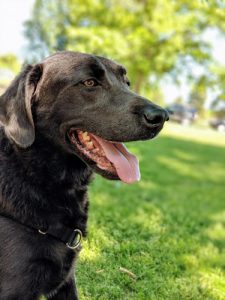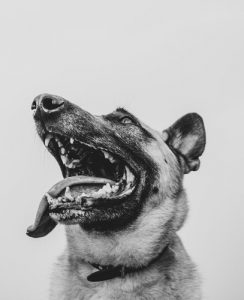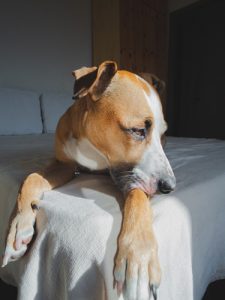A dog panting is normal, right? Yes, it can be, but it can also be an indication that something is going on.
We pant when we are hot, we pant when we are excited, and we pant when we’re full of energy. But if we’re panting excessively or during odd times of the day, like at night when we’re trying to sleep, it could be a sign that something else is happening. Panting is our way of letting our humans know that something is wrong. After all, it’s not like we can easily communicate these kinds of things. So, let’s look at why we might be panting at night and what our moms and dads can do to help.
Common Causes of Panting at Night
1. Heat Exchange
Cooling ourselves down is the number one reason why we pant. We don’t have sweat glands like humans do and therefore cannot sweat to cool ourselves. Panting lets our bodies get rid of excess heat and exchange it for cooler air, cooling ourselves in the process, which often happens at night. Just because we’re not as active doesn’t mean we’re not hot. Just like humans sweat in their sleep, we may need to pant at night to cool ourselves down.
2. Anxiety
 Anxiety is one of the top reasons that dogs pant at night. It’s important to understand why your dog is anxious to determine what you can do to help. Something that may not be stressful to humans might make us extremely anxious. A simple change in our everyday routine or even strange noises at night can be enough to make us very nervous, which leads to restlessness and night panting.
Anxiety is one of the top reasons that dogs pant at night. It’s important to understand why your dog is anxious to determine what you can do to help. Something that may not be stressful to humans might make us extremely anxious. A simple change in our everyday routine or even strange noises at night can be enough to make us very nervous, which leads to restlessness and night panting.
Separation anxiety is also common in dogs. We do not like to be away from our owners. We are pack animals, and our family is our pack. If we are separated from them, even for a short period, we can become very anxious. And I’m not talking about our humans going away. It can be as simple as having to sleep in a separate room. Some dogs are more susceptible to separation anxiety than others, but in any case, panting is how we try and deal with it and try to show that something is wrong.
While we think that puppies who are new to the world and unfamiliar with much of what makes it work may be more prone to having anxiety, it is more common in older dogs. Physical and mental changes occur with age that dogs can have a hard time understanding and become anxious. The older a dog gets, the more common panting at night will become.
3. Stress
While anxiety and stress are often considered the same thing, they are different. Stress is a response to a negative situation, and anxiety is a reaction to that stress. Stress is a short-term condition, and anxiety a long-term one. A dog can be stressed without having anxiety.
Things that often seem insignificant to people can put a lot of stress on a dog. Many things can cause stress for a dog: a new environment (like moving into a new house), a new owner (like an adult dog that has been rescued or placed in a new home), or an unhappy home (that doesn’t necessarily mean an abusive home, but maybe a home that doesn’t offer the love a dog needs). I could go on and on about the things that might cause dog stress.
4. Allergies
 Allergies can also cause us to pant. If the panting is a new thing, there may be an allergen present now that wasn’t before. For example, something new in our environment or even in our food. Maybe our owners picked us up a nice new comfy bed, and we’re allergic to something it’s made of, causing us to pace around and pant at night instead of getting a good night’s sleep.
Allergies can also cause us to pant. If the panting is a new thing, there may be an allergen present now that wasn’t before. For example, something new in our environment or even in our food. Maybe our owners picked us up a nice new comfy bed, and we’re allergic to something it’s made of, causing us to pace around and pant at night instead of getting a good night’s sleep.
5. Injury or Pain
There really is no way for dogs to tell humans when they are in pain, and unless it is affecting us physically, there is no way for humans to know we’re in pain. So, we pant because we’re uncomfortable, and we hurt. Our owners might not even notice this during the day and assume that we are panting because we’re hot or excited. But at night, that pain might become just unbearable enough that we have a hard time dealing with it. The pain could come from an underlying injury, or it could come from conditions that we develop as we get older, like arthritis.
6. Medication
A common side effect of many medications is panting. Even if it’s not listed as a side effect, vets will often warn owners to keep an eye on how much we are panting, as it could be an indication of an adverse reaction to the medication or a sign of dehydration. It is possible that if we’re panting at night, there may be an issue with some new medication.
7. Chronic Illness
Panting and heavy breathing can signal that there is something serious going on with our health.
● Heart Failure
Dogs can suffer from heart failure just like humans can, and many of the symptoms can be similar or the same, like a lower tolerance for activity, coughing, and difficulty breathing. It is that last one that comes into play as far as panting is concerned. If we are struggling to catch our breath, it could lead to us panting more and sometimes uncontrollably.
● Respiratory Disorders
Like heart failure, a respiratory issue, like pneumonia or lung cancer, can leave us struggling to catch our breath and therefore lead to heavy and often uncontrollable panting.
● Cushing’s Syndrome
Cushing’s Syndrome is a condition in which the dog’s adrenal gland produces too much of a hormone called cortisol, used to help your dog respond to stress, control weight, and fight infections. Heavy panting is one of the main symptoms of Cushing’s Syndrome. You can control this syndrome with medicine, but sometimes it may lead to your dog needing surgery.
What Can be Done for a Dog That is Excessively Panting at Night?
People can do a few things to help us with our night panting, but the treatment depends on the cause. So, let’s take a look at a cause-by-cause situation.
● Overheating
While it may not seem like an issue at night compared to seeing your dog running around in the hot sun during the day, your dog can overheat at night or show symptoms of overheating that may have begun during the day. The point is, don’t discount the fact that your dog may be overheating just because it is nighttime. Overheating should not be taken lightly and is one of the more serious reasons why a dog may be excessively panting. If there is reason to believe that your dog is overheating, it’s important to get them cooled off. You can do this by dousing them in cool water. Use cool water, not cold water, as cold water may be too much of a shock to their system. Also, give them cool water to drink or ice cubes to lick. Once their bodies have begun to cool, get them to the vet immediately.
● Stress and Anxiety
I know I may seem as if I’m contradicting myself grouping these two after explaining that they are two different things, and they are. But even though they are different, stress and anxiety can often be handled in the same way.
 A Calming Environment – It’s not always easy to determine the cause of a dog’s stress and anxiety, but providing them with a quiet calm environment can go a long way in helping to relieve it and, in turn, reduce their panting. If there’s a lot going on in the family room, take your dog to the bedroom to give them some quiet. We love your little humans, but if the baby’s crying or the kids are yelling, sometimes it’s best if you give us a place where we can get some peace and quiet to calm down.
A Calming Environment – It’s not always easy to determine the cause of a dog’s stress and anxiety, but providing them with a quiet calm environment can go a long way in helping to relieve it and, in turn, reduce their panting. If there’s a lot going on in the family room, take your dog to the bedroom to give them some quiet. We love your little humans, but if the baby’s crying or the kids are yelling, sometimes it’s best if you give us a place where we can get some peace and quiet to calm down.
Plenty of Exercises – Without overdoing it, exercise and stimulation can help control stress by providing them with an outlet for their built-up energy. Think of it as letting them blow off some steam. Some types of dogs need more exercise than others, so if your dog belongs to an energetic breed, it’s possible that they aren’t getting enough exercise and it’s adding to their stress.
Take Them to the Vet for a Physical – As I discussed, stress and anxiety can increase as dogs get older. Have a vet give them a check-up to see if there might be any physical changes that may be the root cause. Generally, any time your dog has a behavioral change, it’s a good idea to take them to the vet.
Supplements – A supplement can be an effective way of reducing stress. CBD oil can reduce stress not just in humans but in animals as well. Always be sure to check with the vet to make sure supplements are right for your pup.
● Medication
If a vet has put your dog on medication and there are suddenly panting at night, take them back to see the vet. They may need to lower the dose or try a different medication altogether.
● Allergies
The first thing in eliminating an allergen is figuring out what it is. It’s not easy, but if your dog has suddenly started panting at night, there is a good chance that it is due to something you have recently introduced, like a new food or something new in their environment. Remove those new things and see if the panting stops. If it doesn’t, your dog may need to see the vet so they can try and determine the source of the allergy. Some breeds are also more prone to allergies, so they may be a bigger problem for some dogs and not others.
● Injury or Pain
Again, it may not be easy to tell the source of pain or an injury that may be causing your dog to pant. Pay close attention to your dog’s behavior. Maybe they have a slight limp, or they tend to lick a particular spot on their body more than usual. These are other signs of pain. Regardless of what may be causing it, if you suspect that your dog may be in pain, it is a good idea to have your vet give them a thorough examination to help determine the source and then properly treat it.
● Chronic Illness
While this is something that every dog owner should be on the lookout for, it’s not something we can do much about without the help of a vet. If your dog has been panting more and more at night, keep an eye open for other symptoms like heavy breathing, coughing, vomiting, and diarrhea, which, when combined with panting, could be an indication of a serious condition. If any of these are occurring, take them to the vet so that they can run some tests and determine what may be going on.
Don’t panic if your pooch starts to pant; panting is normal. Excessive panting, especially at night when it should be the most calming time of day for your dog, is not normal. While it may not necessarily be dangerous, it most certainly indicates that something is going on. Remember, as dogs, we can’t tell humans what is bothering us. So, it’s up to them to be in tune with the signs that we can provide for them.